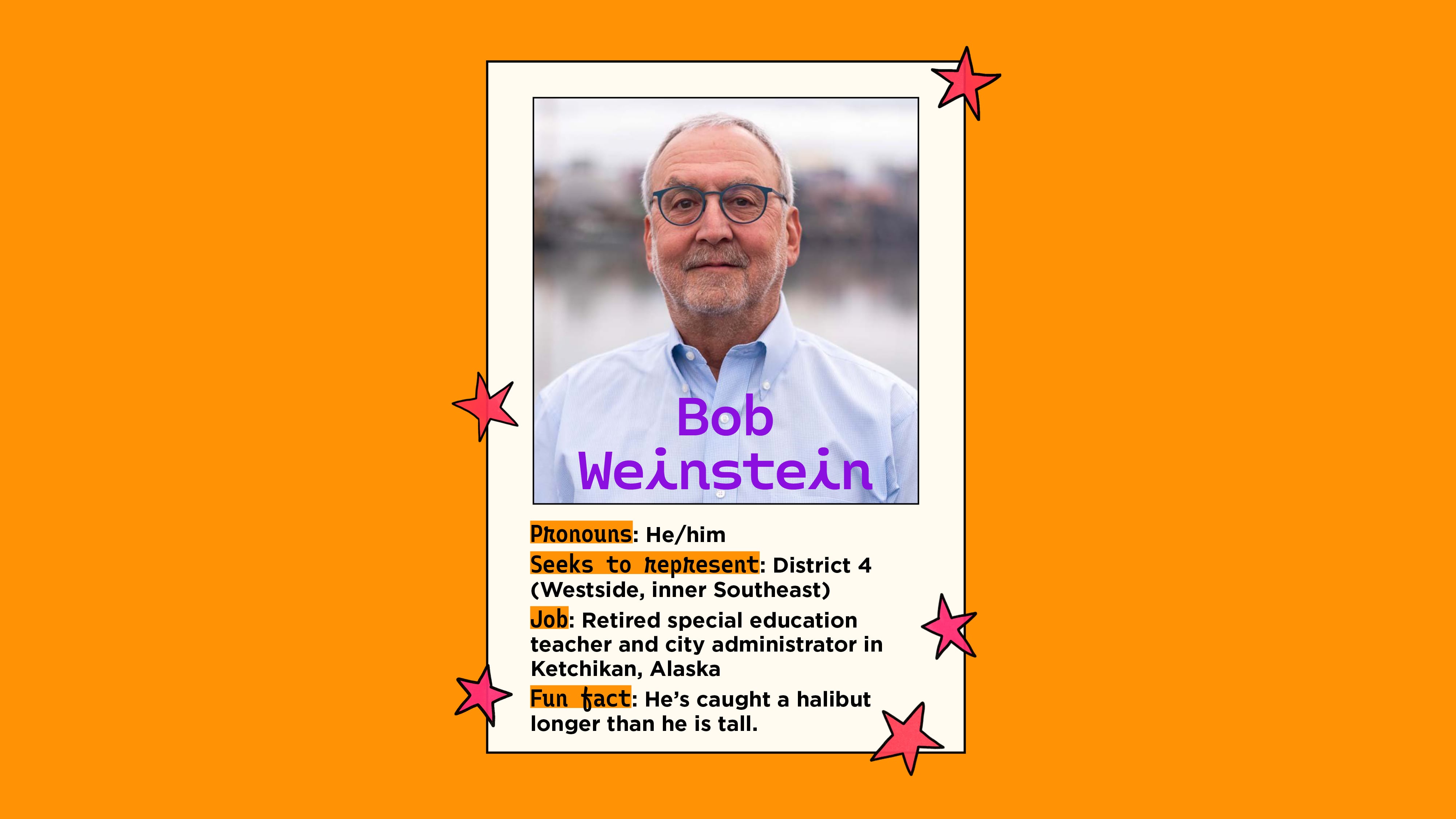Pronouns: He/him
Seeks to represent: District 4 (Westside, inner Southeast)
Job: Retired special education teacher and city administrator in Ketchikan, Alaska
Fun fact: He’s caught a halibut longer than he is tall.
Bob Weinstein has already been a city council member—just a little north of here. He served on the Ketchikan City Council for six years and then was mayor of the Alaskan city for nearly another dozen.
But he’s been back in the lower 48 for six years and wants to steer his new city in the right direction. “From my perspective, city government has become rudderless,” he tells WW.
Weinstein, 73, served as a field representative to U.S. Sen. Mark Begich for five years in Ketchikan after stepping down as mayor. He worked on Southeast Alaska energy issues as well as policy surrounding the Tongass National Forest.
“One thing I learned is that citizens want to contact their elected officials with issues and problems, and they expect to get an answer,” he says. “I’m going to make sure that the legislative part of our government is staffed in a way that citizens get responses when they contact City Hall.”
Weinstein has received $40,000 in matched funds through the Small Donor Elections program. Overall, his campaign has raised almost $73,000. He’s been endorsed by former state Sen. Stephen Kafoury, former Metro Councilor David Knowles, and Willamette River activist Willie Levenson. Weinstein has also been endorsed by Revitalize Portland Coalition, 12 for PDX, and Multifamily NW.
We spoke to Weinstein about his campaign. Questions and answers have been lightly edited for brevity and clarity.
WW: What are your top three priorities if elected?
Bob Weinstein: My No. 1 priority will be focusing our city spending on critical concerns that matter most to Portland residents. So effectively and efficiently directing resources toward one, homelessness and affordable housing solutions; two, public safety; and three, infrastructure improvements—things that affect our daily lives and the livability of our neighborhoods.
Beyond policing, what measures would you take to improve public safety in Portland neighborhoods?
I support a comprehensive approach to both reduce crime and improve livability in the city. No. 1 would be expanding mental health and addiction services, partnering with the county and state agencies to increase access to treatment and crisis intervention. I would expand Portland Street Response so that there can be a non-law-enforcement response to serious mental health crises that are not a threat to either the individual or to other people. I would also enhance youth programs, investing in after-school activities and job training to give at-risk youth a positive alternative.
How would you support local businesses and foster economic growth in Portland?
We need to address public safety concerns so that our city is more attractive for businesses, residents and visitors. I would also support small businesses by doing rapid graffiti removal and storefront repair. We need to streamline permitting processes to encourage new business development and invest in affordable housing and infrastructure to support economic growth. I would expand workforce development programs to meet the needs of business and industry in Portland.
What aspects of the city’s current approach to drug use and overdose deaths do you support and what would you change?
The city’s approach to drug use [changed] on Sept. 1 due to the revision of Measure 110 after it failed to deliver on its promises. I support the changes. We must expand drug addiction services so that treatment becomes the first option for individuals cited for public drug use. When a program like the deflection center is introduced by the county chair, it should be thoroughly vetted by other county commissioners, city officials and professionals to ensure it makes sense and has the best chance of success from Day 1.
Do you support the city staying in the Joint Office of Homeless Services? What’s your plan to address homelessness?
I favor staying in the program for now, [but we] have been missing meaningful metrics, accountability and cooperation from the county government. If that doesn’t happen and the relationship becomes toxic, then a divorce might be in order.
I would like to review where the city and county are at for implementing best practices such as whether or not there’s a coordination of access for a coordinated access system like Houston has. The second thing I would do is streamline permitting for affordable housing projects as well as other developments in Portland.
Which current city council member do you and your policies most align with?
I would say I align most closely with Rene Gonzalez. In less than two years, he’s had the most marked impact on improving public safety. He was an early advocate for the temporary alternative shelter sites, which we know now are working well.
How do you want police to respond to riots if Trump wins in November?
I believe in the democratic process and in an orderly transition in power. I think people have a right to peaceful protest, and I completely support that. If some individuals decide to cross the line and engage in criminal behavior, as we saw in 2020 and again when the PSU library was recently ransacked to the tune of a million dollars in damages, I think the police should respond with an appropriate level of force to stop the behavior and arrest the individuals. We just elected a district attorney who will prosecute criminal behavior associated with riots, should they occur.
Would you change the Portland Clean Energy Fund, and if so, how?
No, I don’t think I’d change it. It was approved by the voters. It serves a good purpose. But PCEF is now generating $210 million per year—seven times what was projected [when voters passed it]. We have a couple of programs with special taxes that seem to be awash with cash while the city and county seem to be scrambling to cover basic needs. I hope that we could have a discussion about our revenue and spending.
How do you feel about the new structure of city government and ranked-choice voting?
I like the fact that we will have a professional city administrator running bureaus on a day-to-day basis so that people like me don’t get elected to the council and put in charge of bureaus for which we have no qualifications whatsoever. I am concerned that the transition team has recommended and the council has approved a host of new bureaucratic positions for temporary work. That was a real slap in the face to taxpayers. I’m also concerned about the failure to approve the four new centralized offices that were recommended by the transition team and approved by the council without taking a meaningful look at the status quo.
See the other Portland City Council Candidates here!
 This article is part of Willamette Week’s Ballot Buddy, our special 2024 election coverage. Read more Ballot Buddy here.
This article is part of Willamette Week’s Ballot Buddy, our special 2024 election coverage. Read more Ballot Buddy here.

